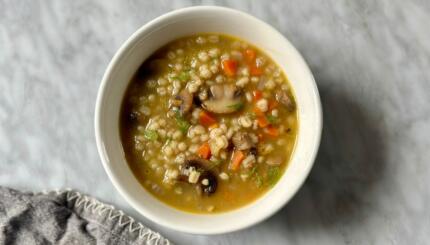Its ribs and wings night. I’m with my husband and eight month old son for two weeks at the camp where my husband and I met and fell in love. He’s the rabbi in residence and I’m playing and relaxing for most of the day with the baby. Camp is peaceful and is mostly how I remember it. Except for ribs and wings night.
Campers are exiting the kitchen with trays laden with spicy buffalo wings and what, I must admit, are some of the best barbecue ribs I have ever eaten. Each time a camper reaches his or her table the entire bunk erupts in mad applause and then sets about the task of even more madly devouring the meat as fast as possible, only for the camper-waiter to return to the kitchen and start the process over again. The salad bar, roasted sweet potatoes and crispy fresh cabbage slaw are on the whole being ignored, and by the end of the night the bones strewn about the tables and heaped into trash cans make the dining hall looks somewhat like a very productive archeological dig.
As my son happily plays on the grass after dinner (after all, his tummy is filled with delicious wings and ribs as well) I ask myself: What’s with the meat mania? There is meat almost every day at camp, and while the wings and ribs that the kitchen turns out are truly exceptional, they are no more so that the amazing roasted cauliflower or the Indian quinoa and tofu veggie meal from Friday night (yes, camp food really has improved!). Why does my otherwise peaceful camp go insane every time there are wings and ribs?
Like brisket, potato latkes, homemade birthday cake, fresh matzah brei and turkey with stuffing, the wings and ribs served at camp are delicious, eaten infrequently, and aren’t exactly the healthiest meal around. The combination of these three factors creates the aura of a superfood (different from the kale and blueberry type of superfood) that is the stuff of legends. There is nothing wrong with indulging in a rarely procured, fatty and entirely delicious food, but there is a way to do so that we don’t get carried away.
To take a line from Pirke Avot (The Ethics of our Fathers), “In a place where there are no men [human beings], strive to be a man [human].” (Pirke 2:5) In other words, enjoy the wings and ribs, but try to have some of the sweet potatoes and veggies with them. Check in with yourself every once in a while to see if you really are still hungry, and eat slowly, enjoying each delectable bite. In the end, there’s nothing wrong with applauding the arrival and consumption of a great plate of food, but I encourage you to do so with mindfulness of why and how the food attained such an elevated, important status.
Keep in mind as well that not all meals at camp (or elsewhere, for that matter) are as special as wings and ribs, but that they can be just as delicious and satisfying in their mundane-ity. The “profane” comforting breakfast of unsweetened oatmeal and banana I consume every morning at camp, including the morning after the “sacred” wing and rib night, reminds me to try to appreciate the continuum that is camp food.
Like this post? Join the conversation through MyJewishLearning’s weekly blogs newsletter.



